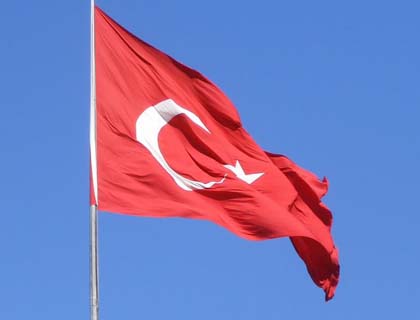ANKARA, Turkey - Turkey expelled Israel's ambassador and said Friday it is cutting military ties with Jerusalem over last year's raid on a Gaza-bound aid flotilla that killed nine people.
Turkey's move came before the anticipated publication Friday of a U.N. report on violence aboard a Gaza-bound protest flotilla. The fatalities included eight Turkish nationals and one Turkish-American activist.
Turkey has made an Israeli apology a condition of improving diplomatic ties.
Turkish Foreign Minister, Ahmet Davutoglu, said the government was downgrading diplomatic ties with Israel to the level of second secretary and that the ambassador and other high-level diplomats would leave the capital Ankara by Wednesday.
He said all military agreements signed between the former allies were also being suspended.
"The time has come for Israel to pay for its stance that sees it above international laws and disregards human conscience," Davutoglu said. "The first and foremost results is that Israel is going to be devoid of Turkey's friendship."
Davutoglu said the report "displayed the violence committed by the Israeli soldiers," but also criticized it for describing Israel's naval blockade as a legitimate security measure and in line with international law.
"Turkey does not recognize the Israel's embargo on Gaza," Davutoglu said, adding that Turkey would take steps to have the International Court of Justice and the United Nations to look into its legality.
Relations between Turkey and Israel, once close, have soured in recent years as Turkey has tilted away from the West. They deteriorated sharply after the flotilla bloodshed.
The U.N. report says "Turkey and Israel should resume full diplomatic relations, repairing their relationship in the interests of stability in the Middle East and international peace and security," according to the copy obtained by The New York Times.
Turkey announced the expulsion of the Israeli ambassador and suspension of military cooperation hours before the report was to be published, the most significant downgrading in ties between the two countries since the bloody flotilla attack last year.
Nine activists were killed aboard the Turkish-flagged ship Mavi Marmara on May 31, 2010, after passengers resisted a takeover by Israeli naval commandos. The flotilla was en route to Gaza in an attempt to bring international attention to Israel's blockade of the Palestinian territory. Each side blamed the other, claiming self-defense.
After the violence triggered an international outcry, Israel eased restrictions on goods moving into Gaza overland but left the naval blockade in place.
The U.N. committee established in the aftermath of the incident was made up of two international diplomats — former leaders of New Zealand and Colombia — one representative from Israel and one from Turkey.
Participants in the flotilla, the committee wrote, "acted recklessly in attempting to breach the naval blockade." Most passengers were peaceful, according to the report, but a small group was prepared for organized resistance. These passengers were "armed with iron bars, staves, chains, and slingshots, and there is some indication that they also used knives."
After soldiers rappelled onto the deck from helicopters, according to the report, "three soldiers were captured, mistreated, and placed at risk by those passengers. Several others were wounded."
"No satisfactory explanation has been provided to the Panel by Israel for any of the nine deaths," according to the report as quoted by the paper.
The committee noted "forensic evidence showing that most of the deceased were shot multiple times, including in the back, or at close range." (AP)

